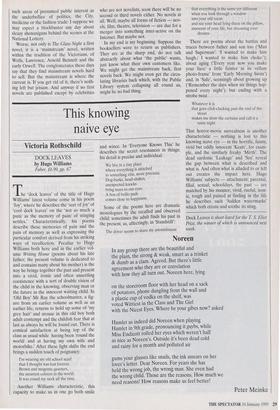This knowing
naive eye
Victoria Rothschild
DOCK LEAVES by Hugo Williams Faber, f6.99, pp. 67 The 'dock leaves' of the title of Hugo Williams' latest volume come in his poem 'Joy', where he describes the 'sort of joy' of 'cool dock leaves' on the 'not so much a pain/ as the memory of pain/ of stinging nettles.' Characteristically, his poems describe these memories of pain and the pain of memory as well as expressing the particular comfort derived from his striking ways of recollection. Peculiar to Hugo Williams both here and in the earlier vol- ume Writing Home (poems about his late father; the present volume is dedicated to and contains many about his mother) is the way he brings together the past and present into a vivid, ironic and often unsettling coexistence with a sort of double vision of the child in the knowing, observing man or the future in the innocent waiting child. In 'Old Boy' Mr Ray the schoolmaster, a fig- ure from an earlier volume as well as an earlier life, returns to hold up some of 'my grey hair' and arouse in this old boy both adult contempt and the childish fear that at last as always he will be found out. There is comical satisfaction at being top of the class as usual while having been 'round the world/ and at having my own wife and motorbike.' After these light shifts the end brings a sudden touch of poignancy:
I'm wearing my old school scarf that I thought was lost forever. Brown and magenta quarters, the smartest colours in the world. It was round my neck all the time.
Another Williams characteristic, this capacity to make us in one go both smile and wince. In 'Everyone Knows This' he describes the secret resonances in things; his detail is precise and individual:
We live in a tiny place where everything is attached to something else, more precious.
Dog-barks, head-shakes, unexpected knocks bring tears to our eyes.
A box of brillo pads comes close to happiness.
Some of the poems here are dramatic monologues by the recalled and observed child; sometimes the adult finds his past in the present, as, affectingly, in 'Standstill':
The driver seems to share my astonishment that everything is the same yet different when you look through a window into your old room and see your head lying there on the pillow, innocent of your life, but dreaming your dreams.
There are poems about the battles and truces between father and son too (Man and Superman': 'I wanted to make him laugh./ I wanted to make him choke.'); about aging (`Every year now you make your face/ a little fainter in its vellum photo-frame' from 'Early Morning Swim') and, in 'Safe', seemingly about growing up ('Remember the days when six things hap- pened every night'), but ending with a strobe twist
Whatever it is that goes click-clacking past the end of the street makes me draw the curtains and call it a rainy night.
That horror-movie surrealness is another characteristic — nothing is lost to this knowing naive eye — in the horrific, funny, vivid but oddly innocent 'Keats', for exam- ple, and the similarly freaky 'Mirth'. The dead sardonic 'Leakage' and 'Sex' reveal the gap between what is described and what is. And often what is alluded to or left out creates the impact here. Hugo Williams' subjects — attachment; parental, filial, sexual; schooldays, the past — are matched by his manner; vivid, rueful, iron- ic, tough and pained at finding in the life he describes such 'hidden watermarks' which both create and soothe its sting.
Dock Leaves is short-listed for the T. S. Eliot Prize, the winner of which is announced next week.









































 Previous page
Previous page